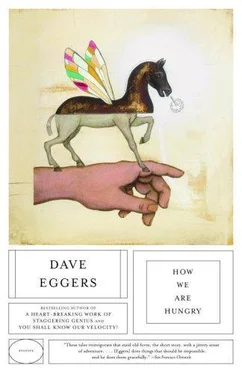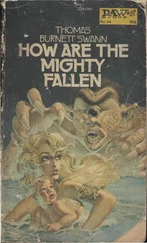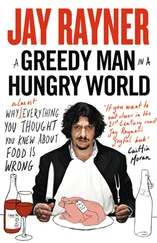Dave Eggers - How We Are Hungry
Здесь есть возможность читать онлайн «Dave Eggers - How We Are Hungry» весь текст электронной книги совершенно бесплатно (целиком полную версию без сокращений). В некоторых случаях можно слушать аудио, скачать через торрент в формате fb2 и присутствует краткое содержание. Год выпуска: 2005, Издательство: Vintage Canada, Жанр: Современная проза, на английском языке. Описание произведения, (предисловие) а так же отзывы посетителей доступны на портале библиотеки ЛибКат.
- Название:How We Are Hungry
- Автор:
- Издательство:Vintage Canada
- Жанр:
- Год:2005
- ISBN:нет данных
- Рейтинг книги:3 / 5. Голосов: 1
-
Избранное:Добавить в избранное
- Отзывы:
-
Ваша оценка:
- 60
- 1
- 2
- 3
- 4
- 5
How We Are Hungry: краткое содержание, описание и аннотация
Предлагаем к чтению аннотацию, описание, краткое содержание или предисловие (зависит от того, что написал сам автор книги «How We Are Hungry»). Если вы не нашли необходимую информацию о книге — напишите в комментариях, мы постараемся отыскать её.
A Heartbreaking Work of Staggering Genius
How We Are Hungry — читать онлайн бесплатно полную книгу (весь текст) целиком
Ниже представлен текст книги, разбитый по страницам. Система сохранения места последней прочитанной страницы, позволяет с удобством читать онлайн бесплатно книгу «How We Are Hungry», без необходимости каждый раз заново искать на чём Вы остановились. Поставьте закладку, и сможете в любой момент перейти на страницу, на которой закончили чтение.
Интервал:
Закладка:
He had traveled widely in the past few years, since a trip with a mutual friend of theirs, now dead, had brought him halfway around the world in a week.
They shuffled down the main strip looking for dinner. There was a tiny bodega selling Miami Herald s from the previous Friday. Some small homes. A shop offering only towels, most featuring birds and monkeys. They found a restaurant with Christmas lights strung from the roof, full of American teenagers, all of them large, the boys bigger than the girls, huge T-shirts draped over their fleshy chests. Pilar and Hand sat down and in response a cat, gray with luxuriant hair, scooted from their feet and onto the tin roof.
The waitress came. She said Buenos nochas . They said Buenos nochas back. Hand said something in Spanish that made the waitress laugh loudly. As she was laughing, Hand spoke again, in Spanish, and the waitress laughed more. She leaned against the table for a second with her hand. She looked at Pilar; she was having a great time. Pilar had no idea what was happening. What had Hand said? Hand was a riot.
“What did you say to her?” Pilar asked, after she left.
“Who?”
“The waitress. What was so funny?”
“Nothing, really.”
“You were killing her. What did you say?”
Hand wouldn’t explain.
They ate dinner, chicken and rice, and wiped their mouths with the tiny triangular blue napkins provided. The cat returned and rubbed against Hand’s shin, back and forth and again, in a way that began to seem inappropriate.
UNSUNG SONG TO HAND: There are things about you / Like your wide waist, which repel / me, but your lips, smiling / shake me, and your brown shoulders / pick me a few inches off the ground / I want to slap you across the face in the loudest way. CHORUS: I want to jump on your back and ride you like a mule / I want to jump on your back and ride you like a mule / I want to jump on your back and ride you like a mule. SECOND VERSE: You’re someone who would lead almost any small nation / if you wanted to, but you don’t / because half of you is odd / but still you have the charm of a leading / man, of an actor who was first a carpenter / someone who still plays lacrosse on the weekends / with the friends he’s always had / I think your lips are too thin / your eyes too closely set / our children might be ugly / but you are a man, and there are so few men in the world. CHORUS: I want to jump on your back and ride you like a mule / I want to jump on your back and ride you like a mule / I want to jump on your back and ride you like a mule.
After they’d eaten but before they left the table, Hand said, “I think I want to make sausages.”
Pilar pretended to be watching the cat on the tin roof.
“There are small machines you can buy that make sausage,” he continued. “You buy the casings and then you stick the meats you want in there. Beef, pork, fat, spices. You ever made a sausage?”
Pilar shook her head. Hand fixed her with his look, brilliant and insane and grabbing.
“There are a lot of things like that, things you can just learn how to make. Like pretzels. Or doors. Regular people can learn how to make those things. Pillows. My mom started making pillows last year. She’s made about eighty so far.”
They walked back through the strip. Americans and Canadians and Swiss crisscrossed the street; some stood and watched the TVs positioned above the open-air bars, fuzzy college basketball happening, though soundlessly. Sunburned couples in white cotton fondled baskets in the souvenir shops. Surfers waited on benches for one of the two pay phones. Twelve-year-old locals sped by on ATVs, three on each bike, huge white smiles.
She counted the reasons she should sleep with Hand: because she was curious about sleeping with him, curious to see him naked; because she loved him; because sleeping with him would be a natural and good extension of her filial love for him; because there existed the possibility that it would be so good that they would change their ideas of each other and then think of themselves as a pair; because to deny one’s curiosity about things like this was small and timid, and she was neither and didn’t ever want to be either; because he had really wonderful arms, triceps that made her jangly in her ribs and tightened her chest; because she was not very attracted to him when away from him — she’d never thought of him while in the tub or flat on her bed — but in his presence she didn’t want to walk or eat, she wanted to be nude with him, under a dirty sheet in a borrowed house. She wanted to hold his shoulders; she wanted to go snowshoeing with him; she wanted to go to funerals with him; she wanted him to be the father of her children, and also her own father, and brother; she wanted all this while also to be free; she wanted to sleep with other men and come home and tell Hand about them. She wanted to live one life with Hand while living three others concurrently.
At the hotel, the horses: two were sitting in the grass, as if they’d been waiting, patiently but with pressing business, the white one glowing faintly, like a star on the ceiling of a child’s bedroom. The third and fourth were standing on the road, by the hedge, their dark hair shining.
HORSES: It’s never like we planned.
HORSES’ SHADOWS ON DIRT ROAD: I wish I could do more.
HORSES: We want violence, so we can kick and tear the world in thirds.
HORSES’ SHADOWS ON DIRT ROAD: I’m helpless to help you.
HORSES: All we need is the spark.
HORSES’ SHADOWS ON DIRT ROAD: When it happens, tell me what to do.
“Jesus,” said Pilar.
“Maybe they live here,” said Hand.
The horses had no symbolic value.
Pilar wanted to describe, to Hand, how she felt, every twenty minutes or so, about being there with him. They were together in the room, which had a roof and was warm. They were alive, though neither of them could have predicted with certainty that at their age they would both be alive — people flew on airplanes and drove cars after so many drinks, and every time they were away from each other or their family or friends, it seemed very likely to be the last; it was more logical, in some ways, to die or disappear. She had not grown up — her parents stayed home always — thinking that people could go far away, repeatedly, all over the earth, starting and finishing lives elsewhere, and then see each other again.
She wanted to rub herself in bananas. She wanted to open umbrellas into the faces of cats, make them scurry and scream. How could she sleep with Hand in this room? If it would be the only time, she wanted mirrors everywhere, so she could remember it a dozen ways.
But it would not be this night because he hadn’t kissed her on the forehead yet. But this would happen. Tomorrow one of them would find a reason to hug the other, and they would hold each other for too long, making sounds about how good it was to be here, and then he would pull away a few inches, to kiss her on the forehead. And the rest would come soon after. She pictured his penis flying across the room and into her, and then shooting in and out. His head on the wall, mounted.
Hand took the couch and Pilar took the bed and they slept to the pulse of crickets and, above, the overeager tick-ticking fan.
The morning arrived with applause and they made toast. In the sun the dirt road was white. All was white. As if Pilar’s eyes had been scrubbed free of pigment.
In a dark shop built to simulate a thatched hut, they rented two surfboards and the woman, orange-haired, oval-faced and Australian, pointed them to the nearest path to the water, across the street and beyond the blond sand.
They carried the boards across the white dirt road and onto the path, the sand soft and ashy. Through thin twisted trees and past a tin-roofed house, the beach spread left and right, flat and hard, at low tide a brown-gray parking lot. Close to the water the hard sand was wet, reflecting a blue sky, wide and musical with huge white flat-bottomed clouds.
Читать дальшеИнтервал:
Закладка:
Похожие книги на «How We Are Hungry»
Представляем Вашему вниманию похожие книги на «How We Are Hungry» списком для выбора. Мы отобрали схожую по названию и смыслу литературу в надежде предоставить читателям больше вариантов отыскать новые, интересные, ещё непрочитанные произведения.
Обсуждение, отзывы о книге «How We Are Hungry» и просто собственные мнения читателей. Оставьте ваши комментарии, напишите, что Вы думаете о произведении, его смысле или главных героях. Укажите что конкретно понравилось, а что нет, и почему Вы так считаете.












